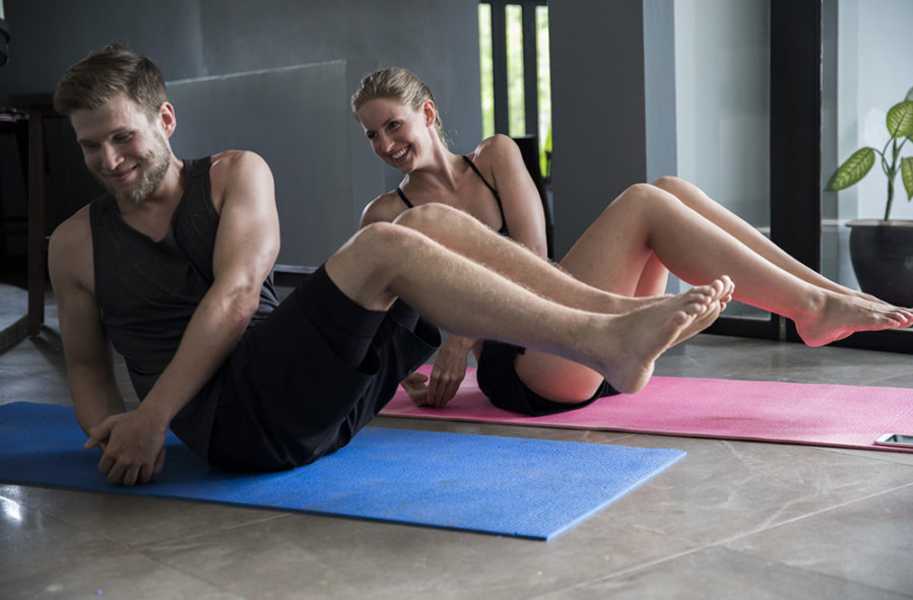
I have often been asked: “When is the ideal time for training? Should I work out in the morning or in the evening? ”
This question seems to occupy many sports enthusiasts who want to get “more out of their training”. I think the reason for this is quite simply that more and more terms like “biorhythm” haunt the media, which want us to believe that there is a universal, ideal training time at which we can achieve maximum performance can.

In this article you will learn:
- Whether there is an “ideal training time”.
- Which training time is the best from a training theoretical point of view.
- What you should consider when planning your training.
- How to find the best training time for you in a flash with the 3-point plan.
Behind modern and weighty-sounding terms such as biorhythm (which, by the way, has not yet been proven) is actually just the simple question: When am I most productive?
That is all that the training theory point of view is about, because for an “optimal workout” it is simply about being able to achieve maximum performance. So if you want to know when you (from If you should train best from this perspective), you simply have to ask yourself when you usually feel particularly energetic and powerful.
By the way, nutrition before the workout is not about anything else! I have also been asked that many times and it is simply about being able to go into training as efficiently as possible. So you don’t have to read specialist books for this, but simply reflect on experience.
In contrast to the time of training, there are some biochemical principles in nutrition that apply to all of us. For example, I can assure you that you will run out of breath with a bar of chocolate before the workout and that you will certainly not be able to achieve your best performance over the duration of an average training session.
On the other hand, I cannot tell you when exactly during the day you will be able to achieve your best performance. Because all the experiences that I have been able to gain suggest that it is largely a question of adaptation. I have often seen that supposed “night owls” take up morning training in a very short time ( and apart from that, getting used to getting up earlier) and being able to continuously perform excellently at this time.
That is the reason why it is completely of secondary importance for training planning when the supposedly ideal time for a workout would be from a training theoretical point of view! Because this is quite flexible and there are much more important practical aspects that you should consider when planning your training.
Below you will find out one after the other what is crucial from the point of view of a coach for determining suitable training times and which should be taken into account when planning
Important: The aspects to be considered are ordered according to their priority. That means that if # 1 already gives you a clear answer as to when it is best for you to train, you need the following Points not to be considered further. Only if there is no clear answer does the following point come into play.

# 1: When is it best for you?
That is actually the most important question. Obviously everyone weighs that up anyway, you might say now, but in my experience just not with the necessary priority.
Many people are more concerned about the ideal time for training mentioned at the beginning than about when it best fits into the existing daily routine – but that is much more important !
Basically, I am primarily interested in long-term development and the main thing is not to lose motivation. If you do not take such obstacles into account when planning and If you decide on a training time based on some biorhythmic considerations that you will probably not be able to keep regularly in the long term, then you plan your failure.
So this point is above all others: When is it best for you?
By the way, you can also be flexible! There is nothing wrong with exercising at different times if this best fits into your everyday life.
Theorists may object that you can get used to a training time and can continuously perform better at this time, while on the other hand you can also get energy lows if you train at different times.
This train of thought is actually not that absurd. But I say: The most important thing is to train at all. Staying tuned is the key to successful training!
The performance is a secondary aspect, especially since the body is very adaptable in this regard. I noticed this when I trained throughout the day in a test phase – over time my body actually learned to be more flexible to be efficient.
But let’s assume that you are quite flexible in terms of time and could arrange to go training in the morning as well as in the afternoon / early evening. So if everyday life doesn’t “dictate” a time window: When would be the best time?
I am primarily interested in what the motivation of my counterpart is like. Does he / she sometimes find it difficult to motivate himself / herself for training?
# 2: Can’t wait to go training, or do you sometimes find it difficult to motivate yourself?
This question is the second most important criterion. If you occasionally have trouble overcoming yourself, I advise you to work out in the morning. As an SP reader, you will surely know that I attach great importance to making training and movement an end in itself in the long term – to train out of enthusiasm instead of having to overcome yourself.
But that too is a process – you don’t wake up in the morning and think “Great, fitness !!!”. Until you get there, discipline is important. Sometimes you just need them to overcome your own indolence.
However, the discipline as part of willpower is quite similar to a muscle – when it is used it is initially exhausted and has to regenerate . In everyday life, especially at work, there are always situations in which you have to overcome yourself, so that the willpower after work is sometimes significantly lower than before.
In other words: In the morning you are still fresh and “unencumbered” from the day. In the evening, on the other hand, you are sometimes exhausted and look forward to relaxing – then it is all the more difficult to motivate yourself for training and more Causing stress when you keep thinking that you “have to” train afterwards. (It is actually not a must, but that’s how many perceive it in the situation described.)
For those who have not yet become part of everyday life with training, I recommend training in the morning.
Advantage: Afterwards you feel all the better, because all day long you have in the back of your mind that you have already done something constructive for your body, for your fitness and health. It can be a very liberating feeling. In addition, exercise is known to release endorphins, so that you are simply happier and more satisfied with everything you do afterwards – and go to work more motivated!
However, if you are an avid athlete and you can motivate yourself well in the evening, we come to the third and final aspect that we should consider.
# 3: Are you particularly prone to injury and don’t feel like doing extended warm-ups?
Well, exercising in the morning has some important advantages, but also disadvantages. Especially crucial: In the morning you are significantly stiffer and therefore need a more comprehensive warm-up, while muscles and connective tissue are already flexible and supple in the afternoon / evening.
This aspect becomes all the more important with increasing age, because the effect (insufficient mobility and suppleness in the morning) and the general susceptibility to injury increase.
You can still train in the morning, but then, as already noted, you should take more time to warm up.
If you don’t feel like doing this and / or would consider yourself prone to injury, you should go training in the evening.
If you haven’t really made up your mind up to now or have not been able to rule out any training time, then there are no rational reasons that speak for or against a certain time and you can choose from the available time windows as you wish. p>
Finally, I would like to give you two things on the way.

First: This article offers a decision-making aid for those who have previously been unsure about the best time to train. Above all, however, he does away with the misconception that it would be particularly effective at a certain time and that one could gain an advantage through such “insider knowledge” – no chance ! What really counts, what really matters, is that you train at all – or move as often and in various ways as possible.
That brings us to the second point: Training is not everything and Training alone is hardly able to make and keep us really healthy, because there is not enough training time. Let’s be honest: How often and for how long do you train per week? The average recreational athlete maybe 3-5 times a week for 30-60 minutes each. Is that supposed to be the amount of movement to which the human body has adjusted in evolution ?!
No, of course not. That is by far not enough to keep him healthy, flexible and supple. For this, it is important to instill movement and mobility exercises, for example hanging or animal movements or even just walks, a few jumps, shoulder rotations, neck circles, spinal waves, intuitively into everyday life beyond training. This is what makes us healthy and thus offers the right basis for targeted fitness training.

 Muscle Gain Or Fat Loss – Which Comes First?
Muscle Gain Or Fat Loss – Which Comes First?  Phenomenon ‘Mental Codes’ – You have to know this secret fitness mechanism
Phenomenon ‘Mental Codes’ – You have to know this secret fitness mechanism  Training with your own body weight: How to get in top form without a gym
Training with your own body weight: How to get in top form without a gym  Daily Discipline – Stop Chasing After And Do What Needs To Be Done!
Daily Discipline – Stop Chasing After And Do What Needs To Be Done! 


